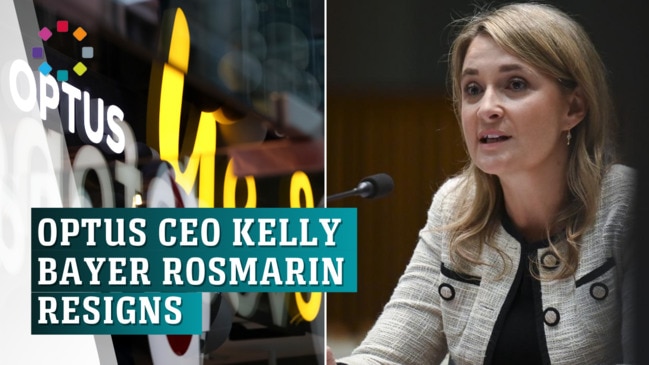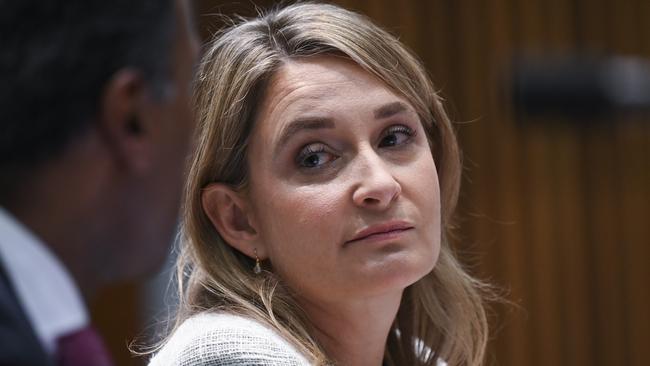Why Kelly Bayer Rosmarin had to go from Optus
The Optus chief had little choice but to resign and there will now be big implications as Singtel attempts to reassert authority over its accident-prone Australian offshoot.

Business
Don't miss out on the headlines from Business. Followed categories will be added to My News.
After a remarkable public spat with her bosses in Singapore, Kelly Bayer Rosmarin had little choice but to resign as Optus chief executive after just 18 months in the job.
Singapore Telecommunications has attempted to reassert its authority over its accident-prone Australian offshoot. And by doing so has also secured the circuit-breaker needed for Optus to take back control after the crisis.
The real question is whether the past two weeks have changed Singtel’s long-term thinking toward Australia.
There was a chance – albeit small – that Bayer Rosmarin could have survived this month’s disastrous day-long network meltdown. This all hinged on how Optus handed the recovery.
The outage had come on the heels of last year’s massive cyber attack. And while that had come at a cost – as much as $140m – in recent months the feeling inside Singtel was that Optus was well on its way to a recovery under Bayer Rosmarin.
Optus had survived the reputational hit of the cyber attack and the telco was again making inroads into rival Telstra’s dominant mobile share. Customer rankings were again improving, helped by the exclusive broadcast rights Optus had to the FIFA Women’s World Cup. The telco appeared to be getting the edge over Telstra after securing a satellite partnership deal with Elon Musk’s Starlink.
However, the opportunity for Bayer Rosmarin to remain disappeared when Optus seemingly launched into the blame game following its massive network outage. Optus failed to accept full responsibility for the meltdown and even went a step further by making a fatal error – it pointed the finger at parent company Singtel for undertaking an international network upgrade that had trigger the national network failure.
This drew a quick rebuke from Singtel – issued through the Singapore Stock Exchange – that it was not behind the crash and put the problem squarely back to Optus.
There was more to the Singtel statement that pushing back on Optus. The telco major had been asked questions by Singapore regulators who had urged the more disclosure around the issue. This was putting the heat on Singtel’s group CEO Yuen Kuan Moon.
That the finger pointing between subsidiary and parent company happened in the first place and then spilt into the public arena was extraordinary enough. It was even more so for an operator like Singtel, that counts the Singaporean government as a cornerstone investor, and works hard to remain out of the spotlight. To many, it looked like the chain of command had broken down.

Bayer Rosmarin’s title might be chief executive here in Australia, but over the past week she was reminded that she is but one of five divisional leaders at Singtel who report through to the group chief executive. In turn Yuen is accountable to the Singtel board.
The disagreement caused reputational damage to Singtel by raising doubts among big customers and regulators about its own pan-Asian network capability. It also undermined confidence back in Australia that Optus wasn’t on top of the problem.
Last year’s massive cyber attack at Optus was a real test for Bayer Rosmarin and even after a clumsy response Singtel gave her the backing she needed.
But she – and her executive team – failed to heed the basic lessons in the aftermath about communication. This became painfully apparent in the past two weeks and she lost the confidence of the majority of the Singtel board.
CEOs need to quickly own the problem in its entirety. They need to tell customers, regulators and staff how they intend to fix it and rebuild trust. That didn’t happen in this case. In fact, Optus lacked the most basic of crisis planning.
Bayer Rosmarin would have seen first hand from her time at Commonwealth Bank about how quickly a public relations disaster – in this case it was Austrac – can engulf a chief executive.
It was Ian Narev who promoted Bayer Rosmarin as a young executive. She was in her late 30s when she took charge of the CBA’s massive and complex institutional banking arm. And those who have worked alongside her regard the 47-year-old as smart, hard working, a strategic thinker and across the detail.
However many say where Bayer Rosmarin remains challenged is in running consumer-focused businesses, where the need to connect with vast numbers of customers is paramount.
The Optus network outage had serious implications with access cut to triple-0 emergency calls yet still Bayer Rosmarin sought to deflect some responsibility for this during last week’s Senate inquiry.
Those close to Bayer Rosmarin said she was aware that she was becoming a distraction for Optus. They say she was thinking about her future at the telco, but had intended to present a clear and strong performance at the Senate hearing. Following the hearing that opened up discussions with Singtel’s CEO with the resignation finalised over the weekend.
Patient Singtel?
Another leadership change at Optus will naturally raise bigger questions among Singtel’s board and its shareholders, including 50 per cent-owner Temasek, about how patient they can be with their Australian investment.
Since buying Optus for the equivalent of $17.5bn more than two decades ago, Singapore has pumped tens of billions of dollars into the telco for just modest returns. The view from Singapore is a realisation that the market here has become more competitive and challenging. The 5G rollout involved a massive capital commitment.

In the year to March, Optus delivered a pre-tax loss of $105m after taking $140m of losses from the cyber attack. This compares to $118m profit a year earlier.
Revenue last year was up slightly at $8.18bn, representing nearly half of Singtel’s overall revenue. No dividends have been paid to Singtel in recent years.
This coming year, Optus will take the lion’s share of Singtel’s planned $2bn-plus investment spending, and the network outage will very likely see the Australian telco return another annual loss.
However, Singapore is thought to be prepared to play the long game. Singapore-based companies recognise they need to expand beyond their own island of nearly 6 million people and Australia has long been regarded as a safe destination for investment.
Those close to the Singtel board say the telco is committed to its position in Australia and sees value in the franchise. There is a thinking inside the board that Singtel seeks scale in all the markets it operates in, and it would take a long time to replicate the substantial position of Optus in any other country. Former Westpac boss Gail Kelly and corporate lawyer turned banker John Arthur both sit on the Singtel board.

The merger in recent years between Vodafone and TPG has made the mobile market more rational and bigger rival Telstra is again aiming for mid-single-digit growth in mobile revenue.
Even so Singtel chief Yuen Kuan Moon has been reviewing ways to extract more value from the global franchise, including the recent $1bn-plus sale of a 20 per cent stake in a regional data centre. Two years ago Optus sold a 70 per cent in the mobile towers infrastructure to AusSuper for nearly $2bn. Optus is expected to review other parts of the business that could present options for more asset sales.
High-profile telco executive Peter Kaliaropoulos, a former Optus executive who worked alongside former long-serving Optus boss Paul O’Sullivan, has been jettisoned by Singtel into the newly-created position of chief operating officer.
Kaliaropoulos, who had been considered as a one-time contender for Singtel’s CEO and most recently ran Saudi Arabian telco Zain, will start this week. Optus is bracing for regulatory scrutiny and Kaliaropoulos will help support interim CEO, chief financial officer Michael Venter.
Optus needs to double down on management oversight of its network and this is where Kaliaropoulos will play a role.
Optus has launched a search for a new CEO with the process to be directed by Singtel.
Singtel will likely opt for someone with strong operational network experience and this will count against Gladys Berejiklian, the former NSW premier turned Optus executive.
An executive who can manage the Singtel relationship will be as equally as important.
When asked on Friday she had considered resigning, she responded it was about “the team, the customers, the community”.
However after publicly challenging the company paying the bills, there was no way she could stay.
johnstone@theaustralian.com.au
More Coverage
Originally published as Why Kelly Bayer Rosmarin had to go from Optus





